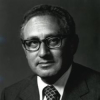Henry A. Kissinger

Henry A. Kissinger
Henry Alfred Kissingeris an American diplomat and political scientist. He served as National Security Advisor and later concurrently as United States Secretary of State in the administrations of presidents Richard Nixon and Gerald Ford. For his actions negotiating the ceasefire in Vietnam, Kissinger received the 1973 Nobel Peace Prize under controversial circumstances, with two members of the committee resigning in protest. Kissinger later sought, unsuccessfully, to return the prize. After his term, his advice has been sought by world leaders...
NationalityGerman
ProfessionStatesman
Date of Birth27 May 1923
CountryGermany
You know, this is a very strange phenomenon. I keep reading that in American newspapers, and I keep reading extensive speculations. I meet with the Chinese leaders periodically, and while I don't say they've endorsed the missile shield, it has not been in the forefront of their discussions.
The convictions that leaders have formed before reaching high office are the intellectual capital they will consume as long as they continue in office.
Far too often, the Ukrainian issue is posed as a showdown: whether Ukraine joins the East or the West. But if Ukraine is to survive and thrive, it must not be either side's outpost against the other - it should function as a bridge between them.
What political leaders decide, intelligence services tend to seek to justify.
I also do not believe that the United States can let itself be driven into a political role by escalating terrorism, and therefore, the leaders of the Arab world and Arafat should do their utmost to put an end to this and then the United States should do its utmost to produce a political solution.
A leader who confines his role to his people's experience dooms himself to stagnation; a leader who outstrips his people's experience runs the risk of not being understood.
Leaders must invoke an alchemy of great vision.
Leaders are responsible not for running public opinion polls but for the consequences of their actions.
Most foreign policies that history has marked highly, in whatever country, have been originated by leaders who were opposed by experts.
Statesman create; ordinary leaders consume. The ordinary leader is satisfied with ameliorating the environment, not transforming it; a statesman must be a visionary and an educator.
It is, after all, the responsibility of the expert to operate the familiar and that of the leader to transcend it.
No one will ever win the battle of the sexes; there's too much fraternizing with the enemy.
A leader does not deserve the name unless he is willing occasionally to stand alone.
The task of the leader is to get his people from where they are to where they have not been. The public does not fully understand the world into which it is going. Leaders must invoke an alchemy of great vision. Those leaders who do not are ultimately judged failures, even though they may be popular at the moment.